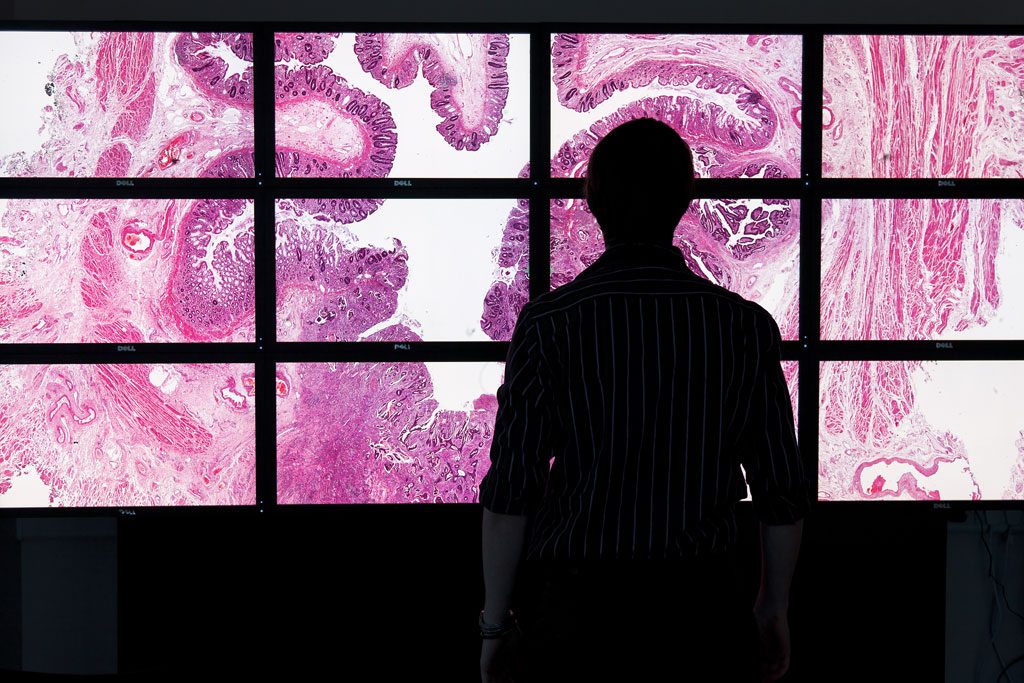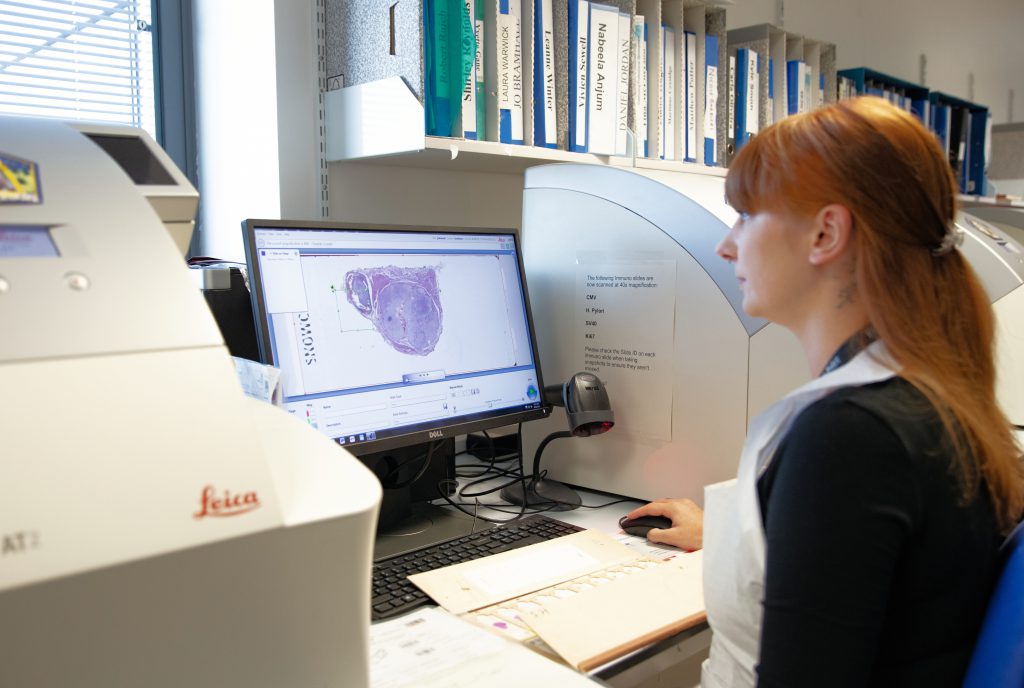
Photo by Section of Pathology and Tumour-Biology, University of Leeds
Leeds researchers have been awarded a £10.1m investment from UK Research and Innovation to expand a digital pathology and artificial intelligence programme across the North of England. Greg Clark, Secretary of State for Business, Energy and Industrial Strategy (BEIS), announced the investment today (Tuesday), as part of the Industrial Strategy Challenge Fund.
The University of Leeds and Leeds Teaching Hospitals NHS Trust welcomed the announcement of national funding which will allow the creation of a digital pathology clinical network and research programme. The successful partnership bid led by the University of Leeds and Leeds Teaching Hospitals embraces a network of nine NHS hospitals, seven universities and ten industry-leading medical technology companies, called the Northern Pathology Imaging Co-operative (NPIC). The investment of £10.1m from UK Research and Innovation is boosted by an initial investment of £7m from the companies involved in the programme. The consortium is now set to become a globally-leading centre for applying artificial intelligence (AI) research to cancer diagnosis.
Sir Alan Langlands, Vice-Chancellor of the University of Leeds, said: “Leeds Teaching Hospitals NHS Trust is a global leader in the area of digital pathology for cancer diagnosis, thanks to the close links with academic researchers. We are now expanding this digitisation across the north through this exciting partnership between universities, the NHS and industry. “Going forward, new technologies such as artificial intelligence have the potential to transform how we diagnose cancer and other diseases, and the University is making great advances in this area.”
Dr Yvette Oade, Chief Medical Officer at Leeds Teaching Hospitals NHS Trust, said: “This is a really exciting step for patients because computers using artificial intelligence can be trained to recognise the patterns of disease. Machines will support clinically trained pathologists to diagnose cancer faster, better and at lower cost. “We can also explore how to use digital pathology as part of precision medicine to ensure patients receive treatments tailored to their disease. This is a huge opportunity for Yorkshire to lead in this new area and further enhance our position as a hub for medical technology.”
“Moving from the microscope to digital images introduces opportunities to automatically extract vital, clinical information as structured data," said Colin Murphy, CEO of mTuitive, Inc. "We are excited to work closely with pathologists and AI scientists to make the best use of this data and share it downstream for improved clinical patient outcomes.“
NPIC will put new digital pathology scanners into a network of northern NHS hospitals, including all of the hospitals across West Yorkshire and Harrogate, to gather digital pathology images for training AI systems. This will generate about 760,000 images per year, about 1.2 Petabytes of data.

Leica Biosystems
The project also aims to develop more integrated ways of working across regional clinical pathology services.
Clinicians will then work with industry and academic researchers to make new AI systems capable of analysing digital pathology images leading to better diagnoses for diseases like cancer. The work will stimulate AI research locally in academic and business sectors, creating jobs and supporting economic growth across the Leeds City Region.
Professor Sir Mark Walport, Chief Executive of UK Research and Innovation, said: “Early diagnosis of illness can greatly increase the chances of successful treatment and save lives. “The centres announced today bring together the teams that will develop artificial intelligence tools that can analyse medical images varying from x-rays to microscopic sections from tissue biopsies. Artificial intelligence has the potential to revolutionise the speed and accuracy of medical diagnosis.”
Dr Darren Treanor, a Pathologist at the University of Leeds and Leeds Teaching Hospitals NHS Trust, is leading the project. Speaking at the Alan Turing Institute today (Tuesday), he said: “Digital pathology is a technology with a huge potential to improve healthcare.“This new northern co-operative will allow us to use digital pathology to help patients across the region, and provide a platform on which we will develop artificial intelligence tools for pathology diagnosis to be used around the world.”
A key part of the project is to consider the ethics of data sharing to ensure NPIC partners abide by the highest professional standards when images are utilised for research purposes. NPIC will engage patients and the public in a programme of work about the use of anonymised images for AI research. It will also inform the development of a ‘national pathology exchange’ - software that allows images to be shared between NHS sites nationally so that patients can benefit from second opinions from anywhere in the UK.
For more information please contact press officer Simon Moore at the University of Leeds on 0113 34 38059 or s.i.moore@leeds.ac.uk, or Ross Langford from Leeds Teaching Hospitals NHS Trust on 0113 206 4098, 07917882958 or ross.langford@nhs.net.
****
About mTuitive
mTuitive, Inc. develops data capture and synoptic reporting software to assist health care professionals in recording clinical findings and maintaining compliance with established protocols and guidelines. mTuitive's unique method of capturing structured information provides valuable data for pathology, surgery, oncology, and cancer staging applications. These products allow the clinical decision maker to conveniently receive alerts and reference materials directly at the point of care. mTuitive solutions improve care to the patient through quality assurance and error reduction while standardizing and automating manual reporting processes, reducing both time and labor costs. To learn more, visit www.mtuitive.com or follow mTuitive on Twitter at @mTuitive.
About NPIC members
The Northern Pathology Imaging Co-operative (NPIC) is led by the University of Leeds and Leeds Teaching Hospitals NHS Trust. Its 26 members include the University of Manchester, University of Nottingham, University of Oxford, Heterogenius Limited, Microsoft Limited, Royal Liverpool and Broadgreen University Hospitals NHS Trust, Sectra Limited, Newcastle University, Roche Diagnostics Limited, University of Sheffield, Harrogate and District NHS Foundation Trust, FFEI Limited, Clinisys Group Limited, Airedale NHS Foundation Trust, Bradford Teaching Hospitals NHS Foundation Trust, University of Liverpool, X-Lab Limited, Calderdale and Huddersfield NHS Foundation Trust, The Mid Yorkshire Hospitals NHS Trust, mTuitive UK Limited, Newcastle Upon Tyne Hospitals NHS Foundation Trust, Royal Surrey County Hospital NHS Foundation Trust, Futamura Chemical UK Limited and Leica Biosystems Limited.
About University of Leeds
The University of Leeds is one of the largest higher education institutions in the UK, with more than 34,000 students from more than 150 different countries, and a member of the Russell Group of research-intensive universities. The University plays a significant role in the Turing, Rosalind Franklin and Royce Institutes. They are a top ten university for research and impact power in the UK, according to the 2014 Research Excellence Framework, and are in the top 100 of the QS World University Rankings 2019. Additionally, the University was awarded a Gold rating by the Government’s Teaching Excellence Framework in 2017, recognising its ‘consistently outstanding’ teaching and learning provision. Twenty-six of their academics have been awarded National Teaching Fellowships – more than any other institution in England, Northern Ireland and Wales – reflecting the excellence of our teaching. www.leeds.ac.uk
About Leeds Teaching Hospitals NHS Trust
Leeds Teaching Hospitals NHS Trust is one of the largest teaching hospitals in Europe, a regional and national centre for specialist treatment. They have a world renowned biomedical research facility, a leading clinical trials research unit and are a national leader in the recruitment of patients into clinical trials. Leeds Cancer Centre provides some of the most advanced treatment and care for patients with cancer anywhere in the world. It is one of the largest comprehensive cancer centres in the country and is recognised as a world leader in cancer research and innovation. Their partnership with the University of Leeds makes them a global leader in Digital Pathology research. They use some of the most advanced diagnostic imaging and medical technology; their patients have access to world-class, state-of-the-art radiotherapy and they have one of the largest single hospital pathology departments in the country.
About United Kingdom Research and Innovation (UKRI)
UKRI is a new body which works in partnership with universities, research organisations, businesses, charities, and government to create the best possible environment for research and innovation to flourish. They aim to maximise the contribution of each of our component parts, working individually and collectively. They work with their many partners to benefit everyone through knowledge, talent and ideas. Operating across the whole of the UK with a combined budget of more than £6 billion, UK Research and Innovation brings together the seven Research Councils, Innovate UK and a new organisation, Research England.